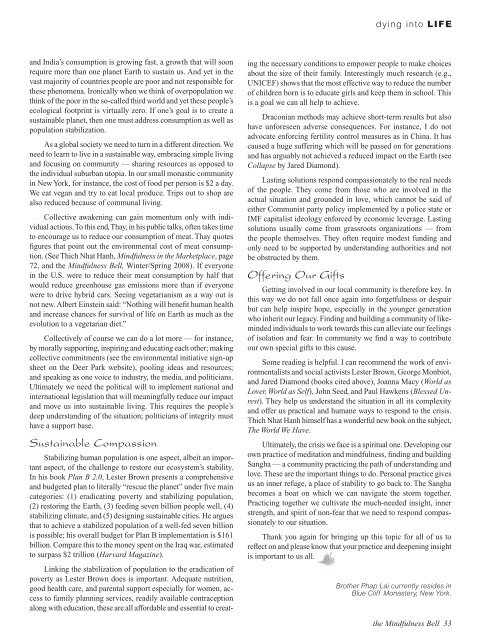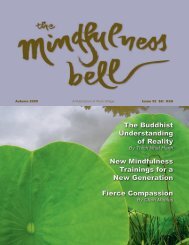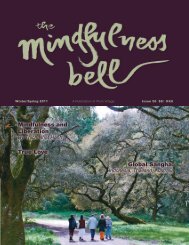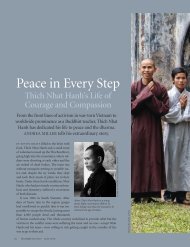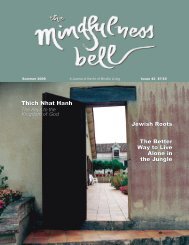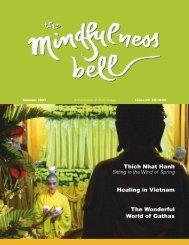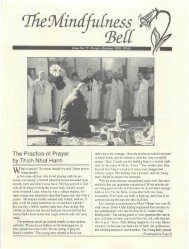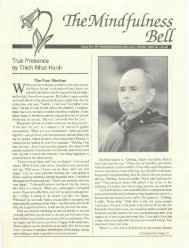Download - The Mindfulness Bell
Download - The Mindfulness Bell
Download - The Mindfulness Bell
You also want an ePaper? Increase the reach of your titles
YUMPU automatically turns print PDFs into web optimized ePapers that Google loves.
dying into LIFE<br />
and India’s consumption is growing fast, a growth that will soon<br />
require more than one planet Earth to sustain us. And yet in the<br />
vast majority of countries people are poor and not responsible for<br />
these phenomena. Ironically when we think of overpopulation we<br />
think of the poor in the so-called third world and yet these people’s<br />
ecological footprint is virtually zero. If one’s goal is to create a<br />
sustainable planet, then one must address consumption as well as<br />
population stabilization.<br />
As a global society we need to turn in a different direction. We<br />
need to learn to live in a sustainable way, embracing simple living<br />
and focusing on community — sharing resources as opposed to<br />
the individual suburban utopia. In our small monastic community<br />
in New York, for instance, the cost of food per person is $2 a day.<br />
We eat vegan and try to eat local produce. Trips out to shop are<br />
also reduced because of communal living.<br />
Collective awakening can gain momentum only with individual<br />
actions. To this end, Thay, in his public talks, often takes time<br />
to encourage us to reduce our consumption of meat. Thay quotes<br />
figures that point out the environmental cost of meat consumption.<br />
(See Thich Nhat Hanh, <strong>Mindfulness</strong> in the Marketplace, page<br />
72, and the <strong>Mindfulness</strong> <strong>Bell</strong>, <br />
in the U.S. were to reduce their meat consumption by half that<br />
would reduce greenhouse gas emissions more than if everyone<br />
were to drive hybrid cars. Seeing vegetarianism as a way out is<br />
not new. Albert Einstein said: “Nothing will benefit human health<br />
and increase chances for survival of life on Earth as much as the<br />
evolution to a vegetarian diet.”<br />
Collectively of course we can do a lot more — for instance,<br />
<br />
collective commitments (see the environmental initiative sign-up<br />
<br />
and speaking as one voice to industry, the media, and politicians.<br />
Ultimately we need the political will to implement national and<br />
international legislation that will meaningfully reduce our impact<br />
and move us into sustainable living. This requires the people’s<br />
<br />
have a support base.<br />
Sustainable Compassion<br />
Stabilizing human population is one aspect, albeit an important<br />
aspect, of the challenge to restore our ecosystem’s stability.<br />
In his book Plan B 2.0, Lester Brown presents a comprehensive<br />
and budgeted plan to literally “rescue the planet” under five main<br />
categories: (1) eradicating poverty and stabilizing population,<br />
(2) restoring the Earth, (3) feeding seven billion people well, (4)<br />
stabilizing climate, and (5) designing sustainable cities. He argues<br />
that to achieve a stabilized population of a well-fed seven billion<br />
<br />
billion. Compare this to the money spent on the Iraq war, estimated<br />
to surpass $2 trillion (Harvard Magazine).<br />
Linking the stabilization of population to the eradication of<br />
poverty as Lester Brown does is important. Adequate nutrition,<br />
good health care, and parental support especially for women, access<br />
to family planning services, readily available contraception<br />
along with education, these are all affordable and essential to creating<br />
the necessary conditions to empower people to make choices<br />
about the size of their family. Interestingly much research (e.g.,<br />
UNICEF) shows that the most effective way to reduce the number<br />
of children born is to educate girls and keep them in school. This<br />
is a goal we can all help to achieve.<br />
Draconian methods may achieve short-term results but also<br />
have unforeseen adverse consequences. For instance, I do not<br />
advocate enforcing fertility control measures as in China. It has<br />
caused a huge suffering which will be passed on for generations<br />
and has arguably not achieved a reduced impact on the Earth (see<br />
Collapse by Jared Diamond).<br />
Lasting solutions respond compassionately to the real needs<br />
of the people. <strong>The</strong>y come from those who are involved in the<br />
actual situation and grounded in love, which cannot be said of<br />
either Communist party policy implemented by a police state or<br />
IMF capitalist ideology enforced by economic leverage. Lasting<br />
solutions usually come from grassroots organizations — from<br />
the people themselves. <strong>The</strong>y often require modest funding and<br />
only need to be supported by understanding authorities and not<br />
be obstructed by them.<br />
Offering Our Gifts<br />
Getting involved in our local community is therefore key. In<br />
this way we do not fall once again into forgetfulness or despair<br />
but can help inspire hope, especially in the younger generation<br />
who inherit our legacy. Finding and building a community of likeminded<br />
individuals to work towards this can alleviate our feelings<br />
of isolation and fear. In community we find a way to contribute<br />
our own special gifts to this cause.<br />
Some reading is helpful. I can recommend the work of environmentalists<br />
and social activists Lester Brown, George Monbiot,<br />
and Jared Diamond (books cited above), Joanna Macy (World as<br />
Lover, World as Self), John Seed, and Paul Hawkens (Blessed Unrest).<br />
<strong>The</strong>y help us understand the situation in all its complexity<br />
and offer us practical and humane ways to respond to the crisis.<br />
Thich Nhat Hanh himself has a wonderful new book on the subject,<br />
<strong>The</strong> World We Have.<br />
Ultimately, the crisis we face is a spiritual one. Developing our<br />
own practice of meditation and mindfulness, finding and building<br />
Sangha — a community practicing the path of understanding and<br />
love. <strong>The</strong>se are the important things to do. Personal practice gives<br />
us an inner refuge, a place of stability to go back to. <strong>The</strong> Sangha<br />
becomes a boat on which we can navigate the storm together.<br />
Practicing together we cultivate the much-needed insight, inner<br />
strength, and spirit of non-fear that we need to respond compassionately<br />
to our situation.<br />
Thank you again for bringing up this topic for all of us to<br />
reflect on and please know that your practice and deepening insight<br />
is important to us all.<br />
Brother Phap Lai currently resides in<br />
Blue Cliff Monastery, New York.<br />
the <strong>Mindfulness</strong> <strong>Bell</strong> 33


